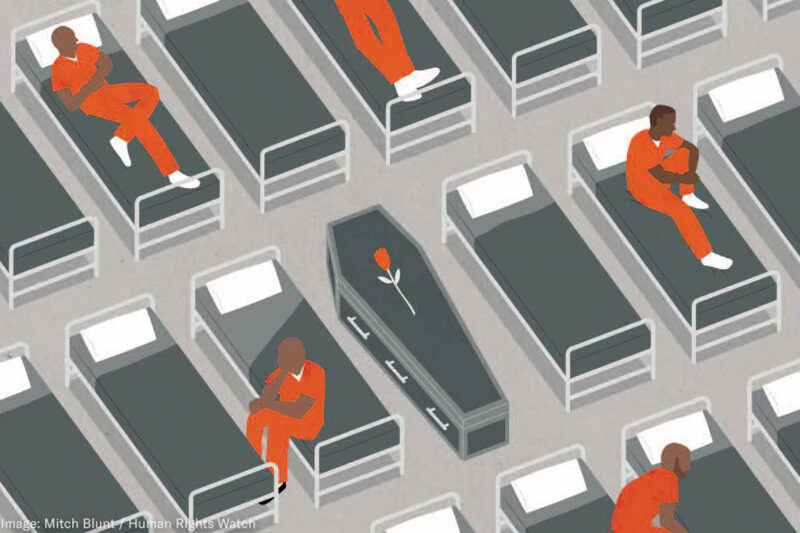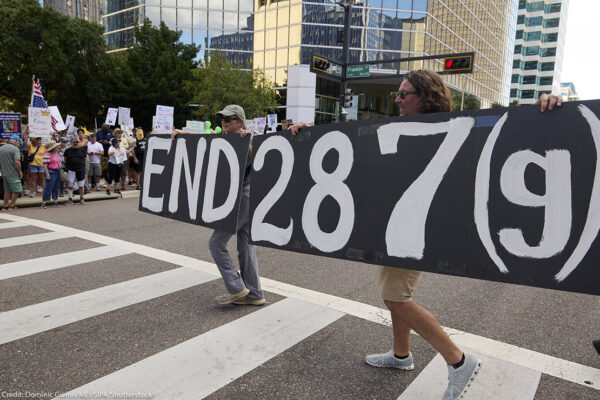
The avoidable tragedy of people dying in immigration prisons across the country is bad and getting worse. More people died in fiscal year 2017 than in any year since 2009.
There have been 75 deaths since 2010, including one at the Eloy Detention Center in Arizona just last week. It’s the latest death in a detention system that is notorious for its inadequate medical care, repeated failures in accountability, and delays in the investigations into deaths.
On Wednesday, the ACLU and our partners released “Code Red: The Fatal Consequences of Dangerously Substandard Medical Care in Immigration Detention,” a report reviewing 15 deaths that occurred in U.S. Immigration and Customs Enforcement (ICE) detention between December 2015 and April 2017. With the help of medical experts, the report concludes that in more than half of those cases, substandard medical care — including unreasonable delays, botched emergency responses, and poor practitioner care — contributed to the deaths.
One of the needless fatalities documented in the report is that of Thongchay Saengsiri, who suffered from clear symptoms of congestive heart failure for 15 months while detained at the privately-run LaSalle Detention Facility in Louisiana. One of our independent physicians with expertise in correctional health noted that “medical staff continued to alternately miss the diagnosis and grossly mismanage it.”
In New Mexico, Rafael Barcenas Padilla died from bronchopneumonia after being detained for 1 ½ months at the Otero Processing Center. Despite exhibiting severe symptoms, he was not immediately transferred to the hospital but instead remained detained for three additional days while his health deteriorated.
In another case, Igor Zyazin repeatedly notified officers of his pre-existing heart condition and the medications he was taking. After he alerted officers that he was having chest pain, they decided to transfer him three hours away to another jail instead of sending him to the hospital. He died at the Otay Mesa Detention Center in San Diego, more than a day after he first complained of chest pain.
Unfortunately, this is not the first time we or our partners have reported on deaths in immigration detention. In 2016, we issued a report with Detention Watch Network and National Immigrant Justice Center titled “Fatal Neglect: How ICE Ignores Deaths in Detention.” It revealed that violations of medical standards played a prominent role in eight deaths in immigration detention between 2010 and 2012. Significantly, the report also revealed that despite deficiencies documented by ICE, the jails and prisons in which these deaths occurred continued to pass inspections and operate.
As the Trump administration moves forward in its efforts to terrorize immigrant communities with the threat of deportation and attempts to eliminate legal protections for the most vulnerable — including asylum seekers, children, and families — it has also been ramping up the immigration detention apparatus. This system of over 200 jails and prisons across the country has had a devastating impact on immigrants, their families, and communities, including long-term residents and asylum seekers.
Every day, thousands of people suffer in immigration jails because they do not receive the medical care that they need and that the government is obligated to provide. We have documented cases where pregnant women suffering pain and bleeding are ignored, where people do not get the life-saving medication they need for chronic conditions, and where individuals with serious mental illness are thrown into solitary confinement.
Yet, rather than maintain existing standards for the operation of these facilities, the administration has made clear its intention to decrease oversight. Given the utter cruelty of this administration toward immigrants and what we already know about immigration detention, we should be seriously alarmed at the potential for more people needlessly suffering because of inadequate medical care and inhumane conditions.
Our new report includes recommended steps that all levels of government must take to protect the lives of people who are being detained.
Congress should immediately reduce the number of people who are detained and ensure accountability for abuses by reducing funding for immigration prisons and requiring ICE to abide by its own rules. Lawmakers should also appoint an independent medical oversight board with jurisdiction over the quality of medical care in ICE detention.
There are many steps that ICE itself should take, such as addressing the many known problems with medical care and monitoring. The agency should also increase transparency by releasing more information about investigations into deaths.
State and local governments can also increase oversight, especially over local jails that hold ICE detainees, and refuse to contract with ICE and private prison companies to expand immigration detention capacity.
The deaths documented in our reports tell the story of a detention system that has grown out of control and without necessary oversight. These consistent, systemic failures must be fixed before more lives are lost.



